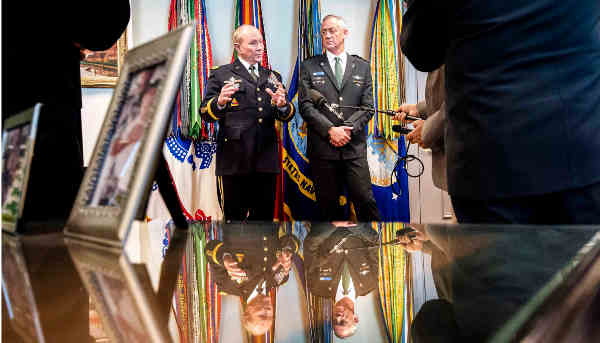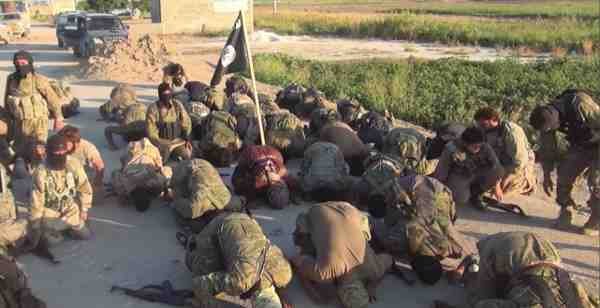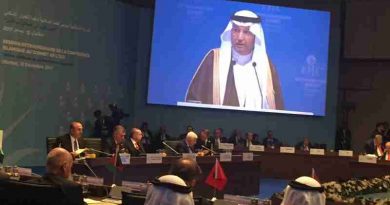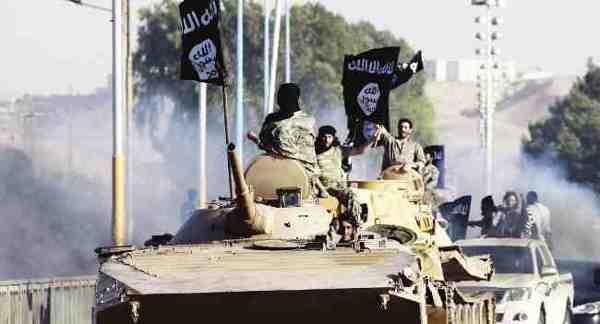Israel-U.S. Cooperation to Ensure Regional Security. Target: Islamic State

The chairman of the Joint Chiefs of Staff hosted the Israel Defense Forces chief of the General Staff at the Pentagon Thursday for talks on regional security and bilateral cooperation.
U.S. Army Gen. Martin E. Dempsey and Israeli Lt. Gen. Benjamin Gantz met to discuss various aspects of Israel-U.S. cooperation.
Gantz said he is not worried about the Palestinians seeking war crimes charges against Israel through the International Criminal Court.
“It is an unnecessary, unilateral step by the Palestinians,” he said.
The Israel Defense Forces are the forces of a democratic, lawful country and they abide by international law, he said.
[ Palestinian Boycott Campaign to Intensify Protest Against Israel ]
“We do huge effort to prevent civilian causalities as much as we can, yet we still have to defend our own population,” Gantz said.
Dempsey and Gantz both hailed the strong ties between their nations. Gantz acknowledged there is turmoil in the Middle East.
“It’s a source of terrorism that might go anywhere,” he said. “I believe the world, led by the United States, must continue to face it, to fight it, and to try to shape a better future.”
When asked about the fight against the Islamic State of Iraq and the Levant (ISIL or ISIS), Dempsey described the strategy with Iraq as a “drumbeat” of “building pressure” on ISIL along several lines of effort, including counter-financing, counter-foreign fighters, and counter-messaging.
The strategy is for members of the Iraqi government to determine how to “best recapture their lost territory to form an inclusive government that includes the Sunni, the Shia, the Kurds, and the other minority groups,” he said.
[ Can Operation Inherent Resolve Defeat ISIS? ]
The United States is working with Iraqi military and civilian leaders, Dempsey said, to determine the “pace at which we will encourage them and enable them to do a counter-offensive.”
The United States, he said, is building the capacity of the Iraqi forces.
“We’re where we need to be,” the chairman said, adding that the U.S. is looking at other areas, including countering improvised explosive devices, to help Iraqi security forces reduce their causalities.
[ Threats from ISIS. U.S. Gets Ready to Deal with Chemical Attack ]
Dempsey said the Iraqi government will initiate, with the United States, “some kind of broad counter-offensive” once Iraq is ready militarily to recapture territory, and then follow that with humanitarian and reconstruction efforts.
About the Iranian presence in Iraq, Dempsey said Iran has been “interested in and sought to influence the future of Iraq since Iraq’s sovereignty was restored in 2004.”
However, the top U.S. military leader said, the Iranian presence and any Iraq partnership with Iran is not troubling at the moment, since it is not threatening U.S. forces or the U.S. mission in Iraq.
“If it is a path that ties the two countries more closely together economically or even politically, as long as the Iraqi government remains committed to inclusivity of all the various groups inside the country, then I think Iranian influence will be positive,” he said.
“But what really matters is where it all goes, and we’re watching that very carefully,” Dempsey said.
💛 Support Independent Journalism
If you find RMN News useful, please consider supporting us.




